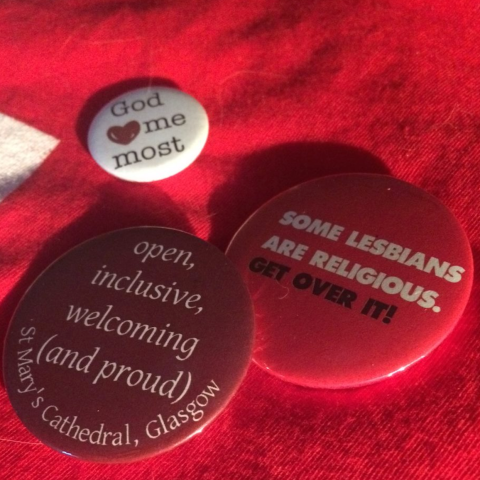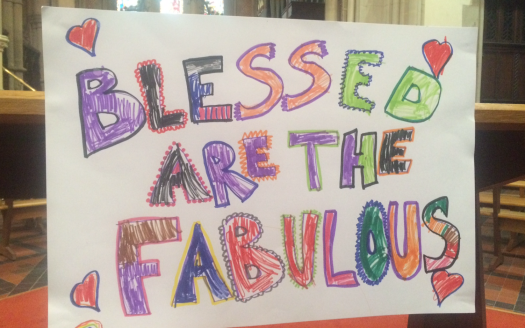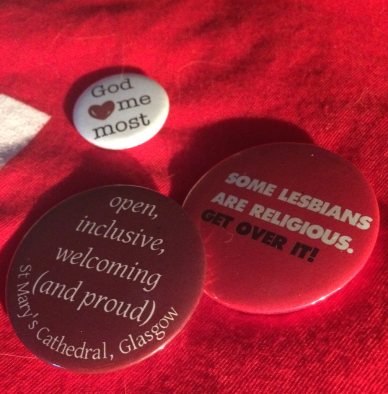
Photo: Beth Routledge. Badges: Kelvin Holdsworth.
One ordinary Thursday in June, my friends and I went to Edinburgh and we changed the world.
I’ve spent a great deal of time these last two months thinking about that day when the General Synod voted for marriage equality in the Scottish Episcopal Church.
This weekend, I’m going to be part of a great and glorious delegation of Scottish Episcopalians marching in the Gay Pride parade through the centre of Glasgow. I’ll be marching with clergy and laity. I’ll be marching with my LGBTQ brethren, and with the many allies who turn out to support us. I’ll be marching with people from around the Diocese of Glasgow and Galloway, and from across the Province, and from the General Synod Office. I’ve been sent with messages of support from the congregation that I represent, as well as friends around Scotland, friends from other provinces, and ecumenical and interfaith friends. This year as I march, I will remember particularly that we march with the personal blessing of the Primus and of each and every Bishop in the Scottish Episcopal Church.

Photo: Gordon Smith
The world has changed so much since the first time I went to Pride.
It is not quite a decade since I met up with four other Scottish Episcopalians on a damp Edinburgh afternoon to march at Pride Scotia, our first one. It was just the four of us, and a couple of umbrellas that were losing the battle, and a vague notion that the Scottish Government might be persuaded to introduce legislation for what we then called gay marriage.
A few months earlier, I had got myself involved with the petition for that legislation. A group of people from St Mary’s Cathedral had taken clipboards and gone up to the University and told people that we were campaigning for equal marriage rights for same-sex couples, and we had been a little taken aback when everyone wanted to sign up. A friend and I had said to each other, “It won’t ever happen, but we have to try anyway.”
In 2008, there weren’t a lot of countries that had even thought about what we now call equal marriage. I have this idea that one day when I’m old and grey I’ll tell this story to people who aren’t born yet who simply won’t comprehend that, but it is the truth. It simply wasn’t a thing.
But as the law went through the process of being debated and voted on in the Scottish Parliament, the idea started to take hold on an international level. My involvement in this campaign in Scotland and the Scottish Episcopal Church has spanned a time that saw the New Zealand parliament singing a Maori love song, and all of Ireland going home to vote, and the interns delivering the news on the steps of the US Supreme Court, and the day it was made the law of the land in Westminster in the country I was born in. It was a time that felt as if the beacon of equality and justice was lighting up the world. It was also a time when we started to notice that Pride seemed to be getting bigger. We were still a ragtag group, but a larger one, and now we had our own banners. The first year we had banners, I made them with felt tip pen and sticky tape on my floor on the Friday night.
And it was during that time, while it was still being debated in Holyrood, that the time seemed right to start making some noise in the Scottish Episcopal Church.
We still didn’t believe it would happen in the Scottish Parliament, mind you, but the Church was being asked to give its opinion and we thought that if we were giving opinions then we might as well be honest about it. If marriage equality were to become the law of the land in Scotland, there were members of the Church who would want it to be possible in church. That was our truth. And so it began.
Said the same friend and I to each other, “This won’t happen, either. But we have to try anyway.”
I still believed that in June. I still believed it in the coffee break between the vote and the result on that ordinary Thursday, and I still believed it as the votes were announced and I did frantic maths. I believed that this day would never come.
Why am I telling this story on the evening before Glasgow Pride? Why am I dwelling on a time when I thought we were going to lose?
I’ll march at Pride this weekend, and I’ll be proud of who we are, and proud of what we did, and proud to stand behind a banner that proclaims to all the world that the Scottish Episcopal Church Welcomes You, and proud that I can say, and mean it, “Yes. Yes. You.”
But the thing I will be proudest of all is that we thought we were going to lose, and we did it anyway.
It is a thought worth holding onto, in these days.
Because nothing that means anything comes without risk.
Because the victories worth having are never in the sure things.
Because the losing battles are the ones that need fighting most.
And because changing the world is not in the winning, but in the knowing you might not and then trying anyway.

Photo: Beth Routledge. Artwork: Audrey O’Brien Stewart.


